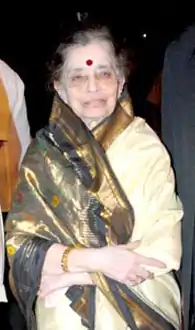Sulochana Chavan
Sulochana Kadam, known as Sulochana Chavan is an Indian singer, known for her lavanis in Marathi. Amongst various others, her famous lavanis include "Tuzhya Usala Laagal Kolha", "Padarawarti Jartaricha" both from film Malhari Martand (1965), "Solaawa Varees Dhokyacha", "Kasa Kay Patil Bara Hay Ka?" both from film Sawaal Majha Aika! (1964). She has also recorded Hindi film and album songs.
Sulochana Chavan | |
|---|---|
 | |
| Born | Sulochana Kadam 13 March 1933 |
| Nationality | Indian |
| Occupation | Singer |
Career
Sulochana started her career at a very early age. While she was still 6–7 years old, she used to be part of local dramas playing role of Krishna in garbas. She then started acting in Gujarati theatre. She took lessons in Urdu language and also worked in Hindi-Urdu plays. She also worked in some Punjabi and Tamil films. She was introduced to the music director Shyambabu Pathak by makeup artist Shubam Dandekar. She then started going to V. Shantaram's Rajkamal Studios with her mother to take lessons in singing. At the age of 11, Chavan started singing professionally. She was credited as K. Sulochana after her maiden surname Kadam.[1]
Her first lavani was "Naav Gaav Kashyala Pustat? Aaho Me Aahe Kolhapurchi, Mala Ho Mhantat Lavangi Mirchi" for the film Rangalya Raatri Asha where the music was composed by Vasant Pawar and the lyrics were penned by Jagdish Khebudkar. Chavan later went on to sing many lavanis through Marathi and Hindi films as well as doing stage performances.[1]
Personal life
Sulochana Kadam was born on 13 March 1933 in Mumbai.[2] She married S. Chavan, director of the film Kalgitura whereupon she came to be known as Sulochana Chavan. She credits her husband for teaching her basics of pronunciation and stress.[1]
Awards and honours
Chavan is conferred the title of "Lavanisamradhni" (Queen of Lavani) for her singing contribution to the art genre. The title is conferred by the notable Marathi littérateur Pralhad Keshav Atre.[1] She was honoured with the Lata Mangeshkar Award for the year 2010 instituted by Government of Maharashtra.[3] In 2012, Sangeet Natak Akademi Award was conferred to her.[4]
Other awards
- 2007 – Lokshahir Patthe Bapurao Puraskar instituted by Pune Municipal Corporation[5]
- 2009 – Ram Kadam Puraskar[6]
- 2011 – "Lavani Kalavant Puraskaar" presented by Sahakarmaharshi Shankarrao Mohite-Patil Samiti[7]
Discography
In films
| Year | Song | Film | Music director | Lyricist | Notes |
|---|---|---|---|---|---|
| 1962 | "Mala Ho Mhantat Lavangi Mirchi" | Rangalya Raatri Asha | Vasant Pawar | Jagdish Khebudkar | |
| 1964 | "Kasa Kai Patil Bara Hai Ka?" | Sawaal Majha Aika! | |||
| "Solaawa Varees Dhokyacha" | |||||
| 1965 | "Padarawarti Jartaricha Mor Naachara Hava" | Malhari Martand | Ga Di Madgulkar | ||
| "Phad Saambhal Turyala Ga Aala" | Based on raga Kalingada[8] |
Singles
| Year | Song | Music director | Lyricist |
|---|---|---|---|
| "Kheltana Rang Bai Holicha" | Vitthal Chavan | Yadavrao Rokade | |
| "Kalidar Kapoori Paan" | Shrinivas Khale | Raja Badhe | |
| "Padala Piklay Aamba" | Tukaram Shinde | Tukaram Shinde | |
| "Aunda Lagin Karaycha" | Vishwasnath More | Ma Pa Bhave | |
References
- "महाराष्ट्राच्या लोककलेचाच गौरव – सुलोचना चव्हाण" (in Marathi). Majha Paper. Archived from the original on 13 November 2010. Retrieved 15 January 2013.
- "लावणीचे अस्तित्व हरवते आहे-सुलोचना चव्हाण" (in Marathi). Mumbai: Lokmat. 24 December 2012. Archived from the original on 16 February 2013. Retrieved 16 January 2013.
- "Lata Mangeshkar Award for Lavni singer Sulochana Chavan". Mumbai: Indian Express. 19 February 2011. Retrieved 23 March 2012.
- "Ilayaraja gets Sangeet Natak Akademi award". New Delhi: The Hindu. 24 December 2012. Retrieved 15 January 2013.
- "सुलोचना चव्हाण, संगमनेरकर यांना महापालिकेचा 'पठ्ठे बापूराव पुरस्कार'" (in Marathi). Pune: Loksatta. 18 January 2008. Retrieved 16 January 2013.
- "सुलोचना चव्हाण यांना 'राम कदम पुरस्कार'" (in Marathi). Maharashtra Times. 10 February 2009. Retrieved 16 January 2013.
- "मोहिते-पाटील लावणी पुरस्कार सुलोचना चव्हाण यांना जाहीर" (in Marathi). Sakal. 10 January 2011. Archived from the original on 19 February 2013. Retrieved 15 January 2013.
- "फड सांभाळ तुर्याला ग" (in Marathi). Aathavanitli Gani. Retrieved 15 January 2013.